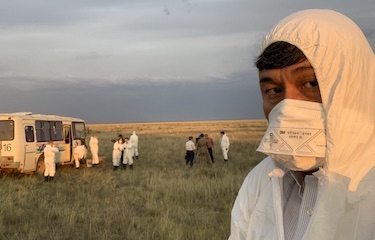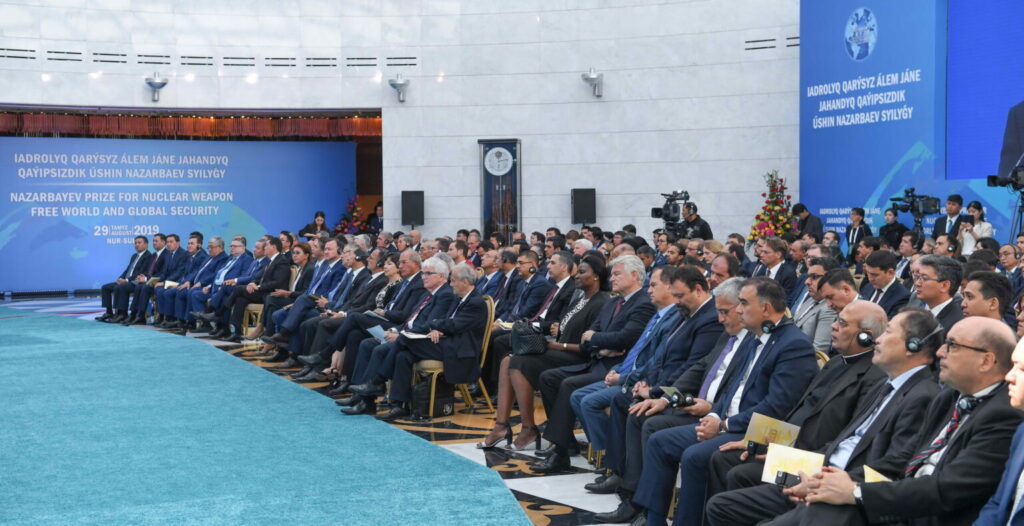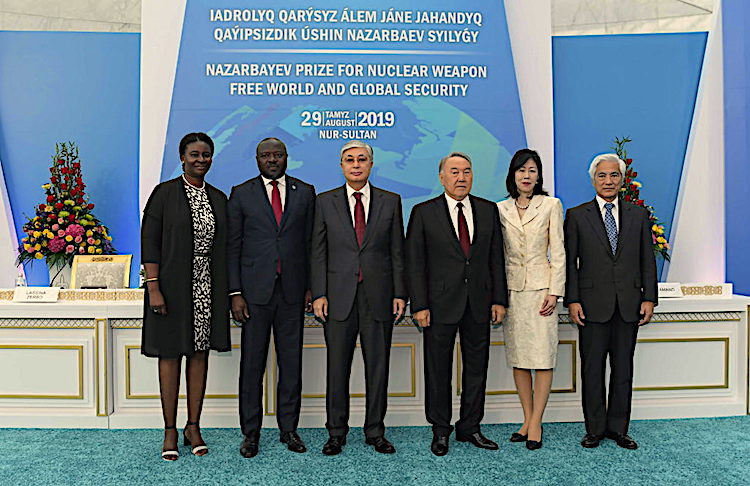By Katsuhiro Asagiri
BERLIN | NUR-SULTAN (IDN) – Kazakhstan, widely acknowledged as a leader in nuclear disarmament and non-proliferation, has availed of this year’s International Day against Nuclear Tests to honour two eminent advocates of a world free of nuclear weapons. The Central Asian republic was one-time holder of the world’s fourth nuclear arsenal as a part of the Soviet Union, defunct since 1991, [2019-08-31] JAPANESE
This year when the UN officially commemorates the Tenth Anniversary of the Day, on August 29, Kazakhstan’s First President Nursultan Nazarbayev presented to the Comprehensive Nuclear-Test-Ban Treaty Organization (CTBTO) Executive Secretary Lassina Zerbo and the relatives of late International Atomic Energy Agency (IAEA) Director General Yukiya Amano, who passed away on July 18, 2019, the Nazarbayev Prize for a Nuclear-Free-World and Global Security in Nur-Sultan.
To receive the Prize, members of late Yukiya Amano’s family arrived in Kazakhstan – widow Yukika Amano and brother, former Permanent Representative of Japan in Geneva, Mari Amano.
Established in 2016, the Nazarbayev Prize is awarded to prominent individuals for their contribution to nuclear disarmament and global security. The first laureate of the Prize was King Abdullah II of Jordan for his contribution to promoting the creation of nuclear and other weapons of mass destruction free zone in the Middle East and the acceptance of 1.5 million Syrian refugees.
Kazakh President Kassym-Jomart Tokayev praised the significant efforts undertaken by late Amano and Zerbo towards nuclear non-proliferation and security.
“Heading the IAEA, Yukiya Amano played a key role in the creation of the low-enriched uranium bank in Kazakhstan and contributed to the settlement of Iran’s nuclear issue. The activities and efforts of Lassina Zerbo have resulted in the near completion of the international monitoring network for the comprehensive nuclear-test-ban treaty. He also took the initiative to establish the CTBTO Group of Eminent Persons and the CTBTO Youth Group,” said Tokayev.
“This year marks the 25th anniversary since Kazakhstan signed the Treaty on the Non-Proliferation of Nuclear Weapons, our country’s membership in the IAEA as well as the 10th anniversary since the establishment of a nuclear-weapon-free zone in Central Asia,” said Tokayev.
The ceremony was attended by prominent figures, such as the former Minister of Foreign Affairs of Italy, member of the Prize Award Committee Franco Frattini, the IAEA Deputy Director General Mary Alice Heyward, former Director General of the Organisation for the Prohibition of Chemical Weapons (OPCW) Ahmet Uzumcu, Deputy Chairman of the Nuclear Threat Initiative Foundation, former UK Secretary of Defense Desmond Brown, former UN Under-Secretary-General for Economic and Social Affairs Sha Zukang, and co-chairman of the International Peace Bureau Reiner Brown.
The participants of the event noted the importance and relevance of the Prize, the key role of the First President of Kazakhstan – Leader of the Nation – in Kazakhstan’s achievements in the field of disarmament and non-proliferation, his activities as a world-class political figure who is pleased not only for the interests of his country, but also the entire world community, as well as an invaluable contribution to strengthening the regional and international security.
The award ceremony coincided with the August 29 International Day against Nuclear Tests, which was unanimously designated by the United Nations in 2009.
The date commemorates the closure of the Semipalatinsk test site, where 456 Soviet nuclear tests were conducted over 40 years. Nearly 1.5 million people in Kazakhstan have suffered from the consequences. Tokayev noted the decision to close the Semipalatinsk test site had “historical significance”.
“Taken against the resistance of the Soviet military elite and individual politicians, the decision of the First President Nazarbayev to close the nuclear test site required great courage and firm will. It has facilitated the entire antinuclear movement,” added Tokayev.
‘Revise the Archaic Concept of Strategic Stability Based on Nuclear Weapons’

In turn, Kazakh First President Nazarbayev said the escalating confrontation between the two nuclear powers, the U.S. and Russia, and their walkout from the Intermediate-Range Nuclear Forces (INF) Treaty produced “serious negative consequences”.
“The renewed nuclear arms race, including in space, that the two countries started, is of great concern. The Intermediate-Range Nuclear Forces Treaty ceased to have effect and Kazakhstan was party to this treaty,” said Nazarbayev.
He warned that the risk of terrorist groups acquiring nuclear weapons remains the gravest threat. “More than 20 countries of the world keep potentially dangerous nuclear materials and each of them can become a target for destructive forces,” said Nazarbayev.
The world’s nine nuclear-armed states (USA, Russia, China, UK, France, North Korea, India, Pakistan, Israel), he added, do not intend to curtail their programmes. With the increasing global distrust and geopolitical confrontation, the world finds itself in an unprecedentedly difficult stage.
Nazarbayev urged the gathering and the international community to take more vigorous steps towards a nuclear weapons-free world. “We need to revise the archaic concept of strategic stability based on nuclear weapons. We need to create a new nuclear arms control system. It is important to negotiate the development of the Universal Treaty on the Reduction of Nuclear Weapons,” said Nazarbayev.
He underscored the need to introduce an effective system of legally binding negative security guarantees from the nuclear powers.

“At the same time, members of the nuclear club must commit to a package of obligations and restrictions to adjust their policies in the area of weapons of mass destruction. It is first of all important that they curtail the traditional practice of maintaining and modernising nuclear facilities,” he said.
Nazarbayev said the award serves as a reminder that the future should entail a world without nuclear weapons.
In the video address to the gathering, UN Secretary General Antonio Guterres thanked Kazakhstan for the efforts.
“A world free of nuclear weapons, including banning on nuclear testing, remains the highest disarmament priority of the UN. Kazakhstan has been strong supporter in this task. I thank former president Nursultan Nazarbayev for his commitment to this cause and the establishment of this prize. This year’s laureates, Yukiya Amano and Lassina Zerbo, richly deserve this recognition,” said Guterres.
The disarmament and nuclear non-proliferation regime faces “deep and growing challenges,” he said, adding: “The international community must stress in its cooperation to achieve our collective goal – the world without nuclear weapons. I count on your support in securing our future.” [IDN-InDepthNews – 31 August 2019]
Top photo (left to right): Ms Zerbo, her husband Nazarbayev Prize laureate CTBTO Executive Secretary Lassina Zerbo, Kazakh President Tokayev, First President Nazarbayev, Ms Yukika Amano, widow of late IAEA Director General Yukiya Amano, Nazarbayev Prize laureate and his brother Mari Amano. Credit: akorda.kz.




